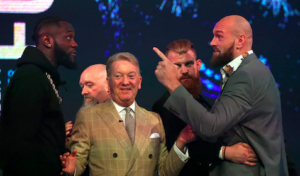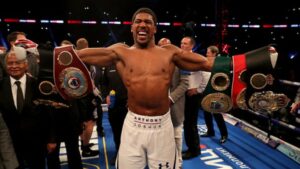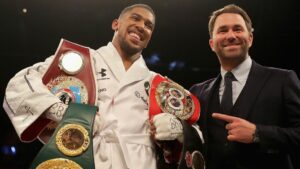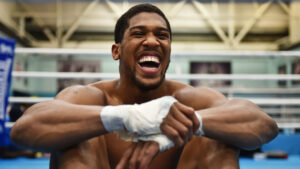Deontay Wilder and Tyson Fury’s whirlwind transatlantic media tour to officially announce their fight came to an end on Wednesday in Los Angeles – with reports emerging that the fight managed to gross a colossal one million dollars of ticket sales within twenty-five minutes.

In what is largely considered the heavyweight division’s biggest fight – situated at the home of the LA Lakers in Staples Center – Wilder, the undefeated WBC champion, will face off against Manchester’s ‘Gypsy King’: the holder of the lineal heavyweight crown following his unanimous points victory over Wladimir Klitschko in 2015.
With their penchant for engaging in pre-fight psychological warfare coupled with active social media profiles, it is safe to say that Wilder and Fury are both huge fighters possessing equally big personalities. With the two men standing six feet seven inches and six feet eight inches tall respectively, the bout represents a bona fide ‘clash of the titans’.

Indeed, this was something that was certainly reflected in the press conferences that took place across three cities in the space of three days, where the two fighters clashed heads (figuratively and literally) on a number of occasions.
Their mutual nemesis in Anthony Joshua – Fury’s compatriot and Wilder’s champion counterpart – casts an unmistakable shadow in the background.

Joshua is generally considered number one in the division. On the whole throughout his career, it is argued, Joshua has beaten the superior names; not to mention the fact that he is currently the unified champion, holding three of the four major belts.
Regardless of rankings, Joshua’s position as the number one pay-per-view superstar in the heavyweight division is beyond question. The former 2012 Olympic super-heavyweight gold medallist enjoys immense popularity in his home country, filling stadiums with increasing regularity; which is something that promoter Eddie Hearn is keen to emphasise when discussing his fighter.

At times, Joshua has enthusiastically entertained the prospect of fighting Wilder or Fury, and at other times, he has exuded a marked indifference and reticence towards the subject of potentially facing one of his rivals – especially following the fruitless negotiations with the Wilder camp.
Likewise, Wilder and Fury, usually eager to denigrate Joshua in interviews, have begun to reciprocate this attitude as of late, with December 1st rapidly approaching.
The commonly regurgitated theory that somehow Joshua’s rivals need him but not vice-versa is not only boring and false, but it is also bad for boxing. The more people subscribe to such a notion, the less pressure this puts on the so-called A-side to actively pursue a fight with the biggest possible challenges.
 As evidenced by the considerable interest in the Wilder and Fury’s respective standalone careers notwithstanding their December 1st date, none of these prizefighters necessarily ‘need’ each other in order to make money and attract fans.
As evidenced by the considerable interest in the Wilder and Fury’s respective standalone careers notwithstanding their December 1st date, none of these prizefighters necessarily ‘need’ each other in order to make money and attract fans.
However, in terms of making history and capitalising on the here and now, it is imperative for Joshua to fight the winner of Wilder-Fury as soon as possible.
Egos and petty promotional posturing remain an all-too-frequent impediment to mouthwatering match-ups actually taking place in boxing. Therefore, when the dust settles after December 1st, the various managers and businessmen behind the two champions must be open in acknowledging the commercial value of the other side.
Although it is true that Joshua’s sheer popularity may be unequalled, it is incumbent on Eddie Hearn to adopt a reasonable and respectable approach in negotiations in order to secure the biggest fight for not only the fans; but for the fighters’ individual sporting legacies.
Article by: Navi Singh
Follow Navi on Twitter at: @DarkMan________